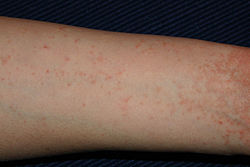Scabies
Scabies is caused by infection with the female mite Sarcoptes scabiei. The mite is an ectoparasite. The mite burrows into the skin to live and deposit eggs.
The symptoms of scabies are due to an allergic reaction to the mites. Scabies is usally spread by direct skin contact with an infected person (at least 10 minutes).[1] Spread of disease may occur even if the person has not yet developed symptoms. Crowded living conditions, such as those found in child-care facilities, group homes, and prisons, increase the risk of spread. Areas with a lack of access to water also have higher rates of disease.
The mite is very small and usually not directly visible.
Scabies Media
Video of the Sarcoptes scabiei mite
A photomicrograph of an itch mite (S. scabiei)
Public health worker Stefania Lanzia using a soft toy scabies mite to publicise the condition in a 2016 campaign
References
- ↑ Dressler, C; Rosumeck, S; Sunderkötter, C; Werner, RN; Nast, A (14 November 2016). "The Treatment of Scabies". Deutsches Arzteblatt International. 113 (45): 757–62. doi:10.3238/arztebl.2016.0757. PMC 5165060. PMID 27974144.








